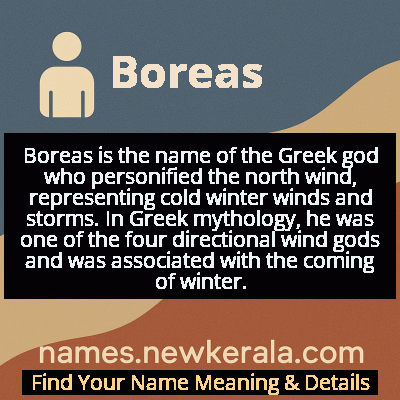Boreas Name Meaning & Details
Origin, Popularity, Numerology Analysis & Name Meaning of Boreas
Discover the origin, meaning, and cultural significance of the name BOREAS. Delve into its historical roots and explore the lasting impact it has had on communities and traditions.
Name
Boreas
Gender
Male
Origin
Greek
Lucky Number
6
Meaning of the Name - Boreas
Boreas is the name of the Greek god who personified the north wind, representing cold winter winds and storms. In Greek mythology, he was one of the four directional wind gods and was associated with the coming of winter.
Boreas - Complete Numerology Analysis
Your Numerology Number
Based on Pythagorean Numerology System
Ruling Planet
Venus
Positive Nature
Harmonious, responsible, caring, and artistic.
Negative Traits
Overly idealistic, superficial, possessive, or jealous.
Lucky Colours
Pink, turquoise.
Lucky Days
Friday.
Lucky Stones
Diamond, turquoise.
Harmony Numbers
2, 3, 9.
Best Suited Professions
Artists, musicians, teachers, healthcare workers.
What People Like About You
Warmth, nurturing nature, artistic flair.
Famous People Named Boreas
Boreas of Athens
Ancient Greek noble
Athenian aristocrat who gave his name to the Boreas tribe in ancient Athens
Boreas Scamandrius
Mythological figure
Son of the river god Scamander, mentioned in Homer's Iliad
Boreas (artist)
Contemporary artist
Modern Greek artist known for atmospheric landscape paintings inspired by natural elements
Name Variations & International Equivalents
Click on blue names to explore their detailed meanings. Gray names with will be available soon.
Cultural & Historical Significance
The myth of Boreas represents the ancient Greek understanding of seasonal changes and natural phenomena, personifying the harsh but necessary winter winds that shaped Mediterranean life and navigation. Beyond mythology, Boreas appears in various classical texts including Homer's Iliad and Ovid's Metamorphoses, where his character explores themes of power, desire, and the relationship between humans and natural forces. His cult in Athens included altars and annual festivals, demonstrating how mythological figures were integrated into civic and religious life in ancient Greece.
Extended Personality Analysis
Individuals named Boreas are often perceived as possessing strong, commanding personalities with an intense and powerful presence. They tend to be associated with qualities of strength, determination, and occasional unpredictability, much like the north wind they're named after. These individuals often exhibit leadership qualities and natural authority, though they may also display a colder, more reserved exterior that can be mistaken for aloofness. Their emotional nature might be characterized by sudden shifts or intense passions, reflecting the stormy nature of their namesake.
However, beneath this powerful exterior often lies a protective and loyal nature, particularly toward those they consider family or close companions. They are frequently seen as independent thinkers who aren't afraid to challenge conventions or stand against prevailing opinions, embodying the rebellious spirit of the untamable north wind. While they can be forceful and direct in their approach, they also possess a creative and transformative energy that enables them to initiate change and sweep away outdated structures. Their personality often combines the destructive and creative aspects of nature—able to clear away the old while making space for new growth and possibilities.
Modern Usage & Popularity
In contemporary times, Boreas remains an extremely rare given name, primarily used by parents with strong interests in Greek mythology or classical studies. The name sees occasional usage in Greece and among diaspora communities, though it's far from common even in its country of origin. Modern usage tends to be symbolic rather than traditional, chosen by parents seeking a distinctive name with classical roots and powerful natural imagery. The name has seen a minor resurgence in recent years as part of the broader trend toward mythological names, though it remains significantly less popular than other Greek god names like Apollo or Atlas. Its usage is almost exclusively male and primarily limited to Western countries with strong classical education traditions, where it appeals to parents looking for a name that conveys strength, uniqueness, and intellectual sophistication.
Symbolic & Spiritual Meanings
Symbolically, Boreas represents raw natural power, change, and the inevitable cycles of nature. As the north wind, he embodies the concept of transformation—the shift from autumn to winter, from warmth to cold, from growth to dormancy. Metaphorically, Boreas signifies necessary destruction that precedes renewal, the harsh truths that must be faced, and the cleansing power of adversity. He represents the untamable aspects of nature and human personality—those elements that cannot be controlled or domesticated. In psychological terms, Boreas might symbolize the shadow self or the unconscious forces that drive human behavior. The name also carries connotations of freedom and independence, as the wind cannot be captured or contained, and suggests the idea of sweeping away the old to make way for the new, embodying both the destructive and creative forces inherent in natural cycles and human experience.

